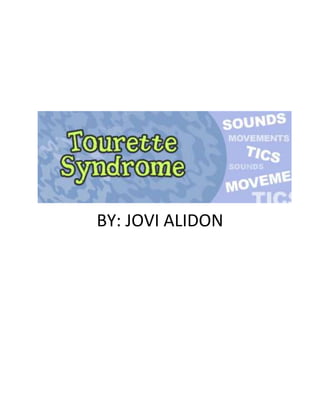
Touretteproject
- 2. Tourette syndrome Tourette syndrome is a nervous system disorder that starts in childhood. This involves unusual repetitive movements or unwanted sounds that can't be controlled. Person with this syndrome may repeatedly blink their eyes, shrug their shoulders or jerk their head. In some cases, you might unintentionally blurt out offensive words. Tourette syndrome typically shows up between ages 2 and 12, average being around 7 years of age. Males are about 3 - 4 times more likely than females to develop Tourette syndrome. Tourette syndrome often lessens or become quiet and controlled after the teen years.
- 3. SYMPTOMS The symptoms, the word Tics is Simple ticssudden, sudden, brief, intermittent brief and repetitive movements or sounds which one of a sign of Tourette that involves limited syndrome. Symptoms can range number of muscle from mild to severe. For severe groups symptoms may interfere with communicating and daily Complex functioning. Tics:coordinated patterns of movements involve several muscle groups Motor Tics:which involves movement like; often facial tics, such as blinking usually happen before vocal tics do. People experience is different and no typical case.
- 4. Causes The causes I found that are the reason for Tourette syndrome isn’t known and a way to prevent it. It’s caused by a combination of genetic and environmental factors. But there are two theories what it’s caused from. 1st Theory 2nd Theory First is Second is Brain Genetics, it Abnormalities; could be an which certain inherited chemicals in the disorder. brain transmit Specific genes nerve impulses may be may play a role. involved; one (Dopamine & genetic serotonin) mutation has been identified as a rare cause of it
- 5. Risk Factors Family history:Having a family history or other tic disorders may increase the risk Being Male:Males are 3-4 time more likely than females. The complications are is it may increase your risk of learning, behavioral and social challenges which harms your self-image. Also in addition most likely they have related conditions are: ADHD, OCD, Learning Disabilities, Sleep disorders, Depression and Anxiety disorders.
- 6. Test/Diagnosis For Diagnose and test for this syndrome, there are no specific test that can diagnose doctors rely on the history of the symptoms. The Diagnostic and Statistical Manual of Mental Disorders (DSM) determines the criteria for a diagnosis. The criteria to diagnose are both motor and vocal tics that happen nearly every day for more than a year. Diagnosis may be delayed because of families and doctors are unfamiliar with the symptoms. Doctors do order blood test, neuroimaging studies, such as MRI.
- 7. Treatment/Drugs There’s not cure for Tourette syndrome. Treatment is to help control tics that interfere with everyday life activities and functioning, but if tics are severe treatment may be unnecessary. For medications it is to eliminate symptoms and side effects which are related condition such as ADHA, OCD etc. Medications include: Drugs that block or deplete the neurotransmitter dopamine in the brain is Fluphenazine, Pimozide. Botulinum (Botox) Helps for Simple Vocal Tics, helps muscle relieve the tics. Stimulants, increase attention and concentration. Central Adrenergic inhibitors, help impulse control problems, & anti-depressants. Lastly there are therapies includes: Psychotherapy, Behavior, and deep brain stimulation